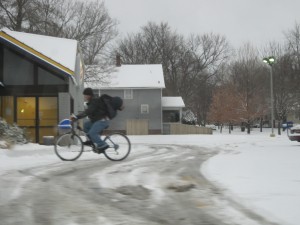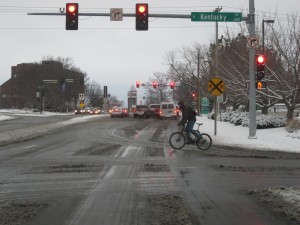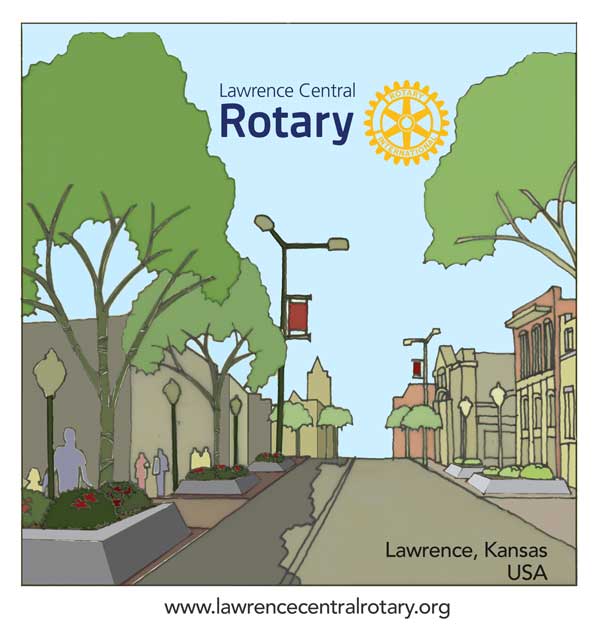The mini snowstorm we received Sunday into Monday Morning didn’t slow down these local bikers..
Page 40 of 57
The article below is a reprint from the 01/12 issue of American City & County Magazine.
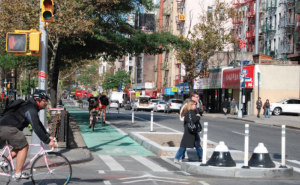
New York City aims to double bicycle commuting over 2007 levels by 2012 and triple it by 2017. The city is working to establish 1,800 bike-lane miles (on streets, in parks and along paths) by 2030.
Cities are turning to cycling-related initiatives as a way to reduce trafic congestion and improve quality of life for residents. They also are finding another benefit of investing in bike infrastructure: a stronger local economy.
A 2011 report from the Political Economy Research Institute at the University of Massachusetts found cycling infrastructure creates the most jobs for each $1 million spent compared to pedestrian only and road-only projects. For the 58 projects in 11 states examined, each $1 million invested resulted in 11.4 jobs within the state.
This past fiscal year, Portland, Ore., spent $7 million — 5 percent of the city’s total transportation budget — on bicycle programs, the most the city has ever spent in one year. The money partially was used to create bicycle boulevards, low volume roadways that serve as primary routes for cyclists. To date, Portland has installed 47 miles of bike boulevards; it built 15 miles this year and plans to add another 15 miles in 2012.
Roger Geller, bicycle coordinator for Portland, believes that bicycle infrastructure is the most effective expenditure of transportation dollars. Portland’s investment generated $90 million in bike-related economic activity in 2008, including consulting, retail and manufacturing.
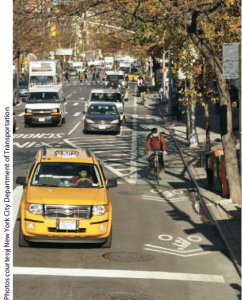 Boston, which looks to Portland for inspiration, began its bicycle initiative in 2007 when Mayor Thomas Menino included cycling as part of his vision for a vibrant and healthy Boston, says Nicole Freedman, director of bike programs for the city. Bike-related jobs in the city — including manufacturing, retail, tourism and contracting — increased 60 percent between 2007 and 2010.
Boston, which looks to Portland for inspiration, began its bicycle initiative in 2007 when Mayor Thomas Menino included cycling as part of his vision for a vibrant and healthy Boston, says Nicole Freedman, director of bike programs for the city. Bike-related jobs in the city — including manufacturing, retail, tourism and contracting — increased 60 percent between 2007 and 2010.
The increase is a direct result of city initiatives, which range from a bike-share program to annual events that encourage bicycle commuting.
Started in July 2011, Boston’s bike share program placed 600 bikes at 60 stations across the city for public use. In its first six months, the bike share program has enrolled 36,000 members and recorded more than 140,000 trips, and has generated more than $321,000 in annual and daily subscription fees as of Oct. 31. Boston also hosts Hub on Wheels every September, an organized bike ride that offers a new perspective on the streets of Boston.
“Cycling is very important to the health and sustainability of a city,” Freedman says. “You especially have to look at the economic health.”
Article by Allison Reilly who is a St. Louis-based freelance writer.
Repost from Bike World News –
Prepare to switch gears this spring. The National Center for Safe Routes to School announced today that it will be coordinating the first-ever National Bike to School Day on Wednesday, May 9, 2012.
Bike to School Day builds on the popularity and success of International Walk to School Day, which is celebrated across the country – and the world – each October, and encourages a bike-focused celebration in the month of May. The National Center, which serves as the information clearinghouse for the federal Safe Routes to School program, is planning the inaugural event in partnership with the League of American Bicyclists, the organization that leads the celebration of National Bike Month.
“Communities and schools have been holding spring walk and bicycle to school days for years,” said Lauren Marchetti, director of the National Center for Safe Routes to School. “This inaugural celebration not only provides an opportunity for schools across the country to join together to celebrate National Bike to School Day but also to build off of the energy of National Bike Month.”
“Celebrating Bike to School Day will increase the excitement surrounding 2012 National Bike Month,” said Andy Clarke, president of the League of American Bicyclists. “Bike Month – including Bike to Work Week and Bike to Work Day – has grown year after year and we’re pleased to add a school- and kid-focused event to the celebration this year.”
Save the date and stay tuned! A newly redesigned version of www.walktoschool.org will be unveiled in early April with more information about Bike to School Day and new event planning resources and tools, including a new GIS-powered walking and bicycling route mapping tool. A “Win a Bike Rack” contest is also being planned to help build excitement and encourage registration of both events and resources for this inaugural event. Bookmark www.walktoschool.org and check back often to learn more.
National Bike to School Day is based on the Walk to School Day model. Walk to School Day was founded in 1997 as a way to bring community leaders and children together to build awareness for communities to be more walkable. The one-day event has now grown to a month-long celebration. In 2011, students and parents from more than 4,000 U.S. schools joined millions of Walk to School Day and Month participants worldwide. The reasons for walking have grown just as quickly as the event itself. For more information, visit www.walktoschool.org.
Bike to School Day, a part of the National Bike Month, will be held on Wednesday, May 9, the week before Bike to Work Week and Bike to Work Day.
Below is a reprint from the LJ World. The story’s original link is:
http://www2.ljworld.com/news/2012/jan/24/program-gives-jobs-lansing-inmates-and-thousands-b/
____________________________________________________________________________________________

Inmate William King works on a bicycle Jan. 18 at Lansing Correctional Facility. The prison’s bicycle repair shop serves the dual function of employing inmates and providing bicycles to those who need them. Since 1999, the shop has donated more than 4,700 bicycles around the area. Photo by Richard Gwin
By Christine Metz
January 24, 2012
Most of the inmates in Lansing Correctional Facility’s bike program shy away from fixing up the frilly girly bikes, but William King gravitates toward them.
“I have a daughter … so, I kind of like the idea of giving it to someone else’s kids,” King said.
Last week, King was using black paint to cover up deep scratch marks that marred a bright pink bicycle. That bike, like the others in the program, had been donated by someone who no longer needed it. And it will end up with a little girl who does.
“My biggest fear is that they will give a bike to a boy and girl, and they will cry and say that it is ugly,” King said.
Since 1999, the bike program has donated more than 4,700 bikes to communities surrounding the prison. They go to refugees in Kansas City who have no other means of transportation, to low-income parents who give the bikes as Christmas presents and to recently released inmates who need a way to get to appointments with their parole officer.
The program started in 1999 with 25 bikes given away. In 2011, more than 500 bikes were distributed.
In Lawrence, Kansas University donates bikes that have been left behind at student dormitories. Clients with developmental disabilities at Cottonwood Inc. use them for exercise. And each spring the Lawrence Lions Club gives away 50 bikes to children whose parents can’t afford to buy them one.
“Someone might think … every kid has a bike. But that is not really true at all. There are a lot of kids out there that are ecstatic to get a bike. They don’t care if it is a new bike or not,” said Brian Edie, who organizes the bike giveaway through the Lions Club.
At Lansing, the bike program is housed in the correctional facility’s minimal security East Unit, which sits on a hill away from the maximum and medium security facilities. Inmates live in barrack-style dormitories that once held the state’s female felons.
The program’s coordinator, Tracy Ashton, has crammed bikes, more than 1,000 of them, into any space she can find. They are underneath porches, in closets and basement corners. The bikes come in all shapes and sizes. There are high-end mountain bikes, brand-name road bikes and old-school cruisers.
One inmate airbrushed skulls onto a Mongoose bike, which will be raffled to raise money for the program. And Ashton is still trying to figure out what to do with a classic Schwinn Sting-Ray.
The bike shop is in the basement of one of the residence halls. It looks a lot like a regular bike shop with tools hanging on the wall, bike parts arrayed across tables and piles of tire rims.
Among the inmates who have been there the longest is Tony Fenoglio. Within 20 minutes, Fenoglio can strip a bike of all its parts and then take the rest of the day to put it back together. Using a toothbrush and solvent, he scrubs clean the brackets and bolts. He polishes the frame with steel wool.
“It looks bad now,” Fenoglio said. “But by the time I take my brush and get it all cleaned up, it will shine like it has been rechromed.”
Fenoglio, who was serving a sentence for drug and assault convictions, first worked at the bike shop in 2005. The job ended when he was released. He returned eight months ago when he came back to prison on a parole violation for another drug conviction.
“If you don’t have a minimum wage job, it’s the best job up here on the hill,” said Fenoglio, who worked construction on the street.
The inmates earn between $12 and $21 a month for working in the bike shop. It employs six inmates. Right now the shop is down two men.
Since the men are in a small space and not supervised all day, Ashton said she needs a group that will work together well. She often hires inmates that Fenoglio recommends.
“Tony’s been here so long his word is good with me,” Ashton said.
Not every inmate has the mechanical mind or work ethic to be in the program. If they don’t, Ashton will find an inmate who does.
The program isn’t funded by the state and relies on donations that mainly come from American Legion Post 23 in Leavenworth.
Dave Thomas, the Legion’s department commander, began collecting money for the program several years ago. The funds mainly go toward paint, spare parts and tools. The American Legion also works to collect bicycles and make contact with the families who need them.
“It’s quite a program. It is really doing something for the community,” Thomas said.
People will bring in old bikes from as far away as Augusta. As for the new ones, the American Legion gives them away at Christmas time and has taken them to Fort Riley for soldiers in the wounded warriors program.
“I get thank-you cards all the time from people,” Thomas said.
The bike program helps the inmates, too. King, who is halfway through serving an 18-year sentence for rape, finds in some way that fixing bikes for other people’s children helps him connect with his own. He will be released from prison right after his daughter graduates from high school.
For Fenoglio, the program makes him feel good. “I just feel like I’m giving back to the community,” he said. “Like I’m doing something worthwhile with my time here.”

Stacks of bicycles fill a room at the Lansing Correctional Facility. The bicycles are refurbished by inmates and sent back into the community. Photo by Richard Gwin
Peopleforbikes.org is dedicated to channeling that passion to improve the future of bicycling. Our goal is to gather a million names of support, to speak with one, powerful voice—to make bicycling safer, more convenient and appealing for everyone.
A video they made is a finalist in the TED – Ads Worth Spreading Challenge. You can see it below, but here is the link on the TED site.
http://www.youtube.com/tedaws?x=us_showcasephase2_8455_27
It’s pretty inspirational.

